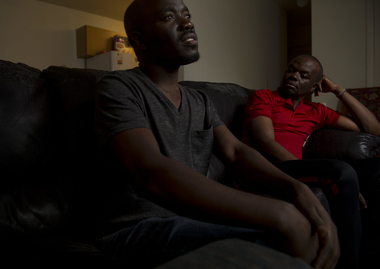Gay Ugandan activists rebuilding their lives in Utah

SALT LAKE CITY — The slurs came at the young boy like barbs.
"I used to talk like a girl . walk like a girl. I used to be in the company of girls, so they called me all sorts of names, because I was expressing like a girl," said Barnabas Wobiliya, 36, who remembers being about 10 when the teasing began.
Apollo Kimuli tells a similar story of his childhood.
"Chimmalgi. That's what they used to call me," the slight, lanky 28-year-old said. "It means flower."
These words left a lingering sting for these young men struggling to understand the feelings they held for other boys.
As adult activists promoting LGBTQ rights and HIV/AIDS treatments, the two were repeatedly beaten, arrested and jailed, before finally, fearing for their lives, they fled Uganda, to seek safety and asylum — a quest that led first to Kenya and then, in 2016, to Utah as refugees.
Uganda is one of more than 30 African nations with anti-homosexuality laws. Just being gay is illegal and can send you to prison for seven years. It's also a crime to advocate for gay causes or to fail to report a gay person to authorities.
Activism around gay rights or gay causes is a dangerous and sometimes deadly occupation.
Violence is not uncommon and many have died fighting against the country's oppressive, discriminatory policies.
Despite those risks, Wobiliya and Kimuli were driven to put their names and faces to the cause in hopes of saving the lives of gay Ugandans who were dying from AIDS.
"Activism is like a spirit," Kimuli said. "The moment I came out in the media, I never thought of (the risk). I was beaten, arrested I don't know how many times, but I couldn't care."
It was while working with the Most At Risk Populations Initiative, which provided HIV testing and other resources to gay men and sex workers, that he met Wobiliya. The two later forged a friendship as their paths crossed again and again in the community.
In 2015, however, the dangers changed. Homophobia and violence had increased and the emotional tolls intensified.
Wobiliya was reported to police and evicted three times by landlords who questioned whether he was infected with AIDS and feared their own arrest.
Around the same time, Kimuli was stopped by police while driving home to Mbale from a workshop in Entebbe. The officers beat him badly, he said, which drove him to start thinking about how to find a more peaceful existence.
"I was like, 'I think enough is enough,'" he said. '"I'm done.'"
Without a wallet, money or a travel visa, he fled to Kenya with just the clothes on his back, hoping he would be allowed to cross the border with only his passport.
Whether by accident or fate, Kimuli and Wobiliya unexpectedly crossed paths at a United Nations refugee center in Nairobi, where both registered for asylum.
Within 15 months, both men were approved for resettlement and left Kenya for the United States. They arrived in Salt Lake City within days of each other in late September and early October 2016.
"They are thriving," he said. "They hit the ground running, have made many friends."
These days, the two — who both want to study to become nurses — are continuing their activism online. They're focused primarily on providing financial help to LGBTQ youths in Nairobi.
"This is more frustrating because you are far away," said Kimuli. "You can't do as much if you are not on the ground."
This fall, just before the anniversary of their arrival in the Beehive State, Equality Utah honored the men with a "fighting spirit" award during its annual fundraising dinner. The honor is a nod to the suffering and sacrifices Wobiliya and Kimuli endured and their unwavering commitment to continuing to work to improve the lives of LGBTQ Ugandans, Troy Williams, Equality Utah's director, said.
"It's one thing to be an activist in Salt Lake City and know that if I'm arrested for something, I'm going to be out of jail at the end of the day," said Williams. "For them, it's a very different story. They risked their lives to advocate for people with HIV. That kind of courage, to me, is astonishing."
By JENNIFER DOBNER, Associated Press
Copyright Associated Press. All rights reserved.
The Gayly 12/9/2018 @7:05 p.m.





